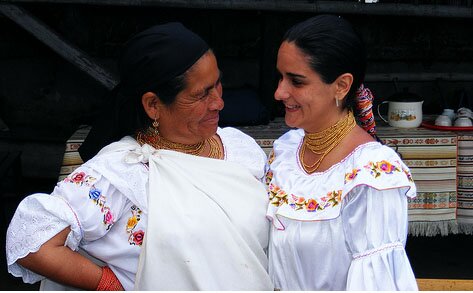Do you believe travel can be a force for good? Since 1980, the United Nations World Tourism Organization (UNTWO) has celebrated World Tourism Day on September 27th to bring awareness to the importance of tourism and its social, cultural, political, and economic value.
As UN Secretary General Ban Ki-moon expresses in his World Tourism Day 2011 Message, this day is based on the belief that tourism can change people's lives for the better. This idea is really quite empowering for the traveler; it means that your travel choices matter, including your decision to travel at all. But as any superhero can tell you: with great power comes great responsibility. Mr. Ban's statement is also a call to actively engage with the culture of the country you are visiting--a prescription which lies at the heart of this year's theme of "Linking Cultures."
We celebrate the theme of "Linking Cultures" in honor of the power of tourism to connect people from all different walks of life and parts of the world. Indeed, there are many who say that the best part of traveling is the people you meet. Traveling always presents amazing opportunities to connect with others whose lives are entirely different from your own. Something truly wonderful happens when two people from completely different backgrounds, say for example, an American suburbanite and a rural Ecuadorian villager, share their experiences and, laughing in awe and fascination at the strangeness of the other's daily routine, suddenly discover something they have in common. I think many travelers can relate, having experienced similar interactions and the good feeling that goes along with them--the satisfaction of having really connected with someone.
If tourism is to foster cross-cultural understanding and peace, then it is necessary for us to travel responsibly, with respect, curiosity, and open-mindedness. Responsible travel requires active engagement on the part of the traveler because unfortunately, irresponsible travel choices can actually do harm to the cultural and economic well-being of local communities. For example, certain hotels do not make it a point to hire their staff locally, thereby preventing income from tourist activities from benefitting the local community and sometimes even driving local families out of business. To avoid this, responsible travelers do their research and use sites like SustainableTrip.org, where all the hotels listed have made a commitment to support local communities and protect the environment. Another great resource is "The Responsible Tourist and Traveler," a practical guide to traveling sustainably developed by the UN based on the principles of the Global Code of Ethics for Tourism.
One excellent way to truly immerse yourself in another culture and at the same time be confident that you're supporting local communities is by participating in community-based tourism. A community-based tourism business is one that is owned and operated by the local community. Locals with intimate knowledge of the area will show you their home's beautiful natural environment and wildlife and will teach you about their unique customs and way of life. Some of these businesses have lodges where they welcome visitors, while others facilitate home stays, where you can live with a local family and experience their daily life first-hand. This type of tourism is perfect for travelers seeking a truly authentic cultural experience, especially for those who prefer rural areas hidden away from tourist hotspots. The local community also benefits, as some or all of the tourist income is reinvested in community initiatives, such as healthcare and education. In addition, when local people are aware of the commercial and social value placed on the environment and their culture, they are more likely to preserve them rather than turning to other means of earning a living, such as unsustainable hunting or deforestation.
Community-based tourism is just one way of engaging in local travel. After all, there's only so much you can get out of the guidebooks; the only way to truly learn about a new culture is by spending time with local people. A great place to start is with food – because who doesn't love food? Find out if the local people fish, farm, or raise livestock, and try to go see it in action. For example, Consorcio Por La Mar in Costa Rica takes travelers out on a fishing boat, teaches them the traditional fishing techniques of the region, and lets them try to catch their own dinner! For more ideas, check out Local Travel Movement, a non-profit platform that shares information and stories about local travel -- a terrific resource for sustainable travelers!
The great American author Mark Twain once said, "Travel is fatal to prejudice, bigotry, and narrow-mindedness." In this regard he is clearly in agreement with the principles of World Tourism Day and this year's theme of linking cultures. Inter-cultural dialogue is at the heart of tourism and leads to greater understanding, solidarity, and peace. Do you agree? Do you believe travel can be a force for good?
Check out this beautiful slideshow of hotels and tour operators that are linking cultures through sustainable tourism:






#1 by Natasha on 9/27/11 - 10:39 AM
#2 by Chaa Creek, Belize on 9/27/11 - 11:15 AM
@chaacreek